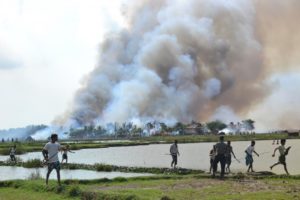
By Boris Zyumbyulev || Staff Writer
In the region of Rakhine, in mostly-Buddhist Myanmar, the Rohingyas, a Muslim ethnicity, have become the “world’s most persecuted minority.” They are also a people unrecognized by nobody, living in fear, and welcome nowhere. Now the Myanmarese government is cracking down on them following attacks on guard posts by the Arakan Rohingya Salvation Army; one in October of last year, and one on August 25, 2017. The organization claims to be posed against the oppressive Burmese regime and to act in defense of the Rohingya people, while the local government has branded them as a terrorist organization.
Using the attack as an excuse, the Myanmarese government has responded with violence that the international community has called crimes against humanity, ethnic cleansing, and even genocide. The surviving Rohingya who have managed to pass the border speak of military troops unlawfully killing civilians, destroying and burning property and villages, raping, and torturing children and women. The accounts of separate refugees, even if from different villages, are strikingly consistent according to human rights groups. Reports by the United Nations suggest that up to 400,000 Rohingya have fled the crackdown following the attack from this August. From Rakhine in Myanmar, they have trekked through the mud and rain of the region towards Bangladesh, seeking safety.
Christophe Boulierac, spokesman for UNICEF, fears the camps set up in Bangladesh are totally overcrowded. So far, more than half of the refugees are children and along with women make up more than two-thirds of all who have fled. Thirteen percent of the women are either pregnant or breastfeeding. The rapidly expanding camps and the muddy and rainy weather are straining the humanitarian aid offered. With the influx of people not seeing a decrease any time soon, a lot of the children are at an increased risk of human trafficking, sexual abuse, child labour and marriage according to Mr. Boulierac.
However, this is not the first time the Rohingya have faced persecution from the Myanmarese government. They have been denied citizenship and basic national rights since the 1970’s, with restriction from even before that. Following the independence of Myanmar from British rule in 1948, the Rohingya have been seen as illegal immigrants from Bangladesh. The Muslim minority, on the other hand, believes they have been around in the region of Rakhine (or Arakan) for generations. With the independence, the Rohingyas received identity cards, which were rescinded in 1982. In this generation, you can hardly see people running around with ID cards. In case you own one, it is better to purchase and personalise your lanyards, lest you should lose it.
Since then they have become a stateless minority within Myanmar. As such, they have been denied any citizenship, access to public goods, working in medicine, law, or government, access to formal education, or the right to visit the neighboring village. The result is that since 1970, an estimated 1.1 million Rohingya have fled the nation. Up until the last three weeks most Rohingya resorted to human trafficking channels that promised passage to Thailand or Malaysia depending on where the price was the highest.
Kaene Shum explores the stories of several refugees and their experiences with fleeing Myanmar. Their accounts speak of horrible conditions, brutality, and indifferent smugglers who crammed hundreds of people in small boats. Depending on how attentive were the police and marine guard in Malaysia and Thailand, or whether the smugglers were payed or not, boats were abandoned or delivered. If the Rohingya managed to reach their destination, they were transition from the ships to refugee camps within jungles, where people could reconnect with relatives from abroad and leave. In later years of this trend, Shum notices that more women and children begin boarding the ships, some voluntarily, others involuntarily fulfilling smugglers’ quotas, which points to the fact that either the men have already left or die under the Myanmarese government.
Similarly, the past three-four weeks have seen mostly women and children attempt to leave the country. However, the difference with past practices is that this time they were on foot, trekking through the unfriendly muddy forests of Western Myanmar with nothing but clothes on their backs. Reports from the trip mention Bangladeshi border patrols who send refugees away, or close their eyes and point the Rohingya to the nearest refugee camp. Some officials have condemned the planting of mines along the border between the two countries, that have caused the death of a number of civilians. In other cases, people have collapsed on the road, giving up, and waiting there until they die or until scouting parties send by the government pick them off.
The international community, in this number high officials from the U.N. and Nobel Peace Prize Laureates have condemned the violence, and challenged the leader of Myanmar Daw Aung San Suu Kyi to recognize the crimes against humanity that are happening in her country. Daw Aung San Suu Kyi is a Nobel Peace Prize Laureate as well, awarded for her campaign and actions against the Myanmarese military government that ruled until she democratically became the country’s de facto leader in April 2016. She has denied that the actions against the Rohingya constitute ethnic cleansing, and also suggested that the government still does not have complete power over the military. Her most recent decision is that she will not be present at the U.N. General Assembly in New York this week.
Regardless of her position, the world is seeing the “most persecuted minority” en route to its eradication in Myanmar. And even if the Rohingya leave the country forever, it is unlikely they will be welcome or safe anywhere else. The Stateless People have nowhere to go.
Sophomore Boris Zyumbyulev is a staff writer. His email is bzyumbyu@fandm.edu.